Organisational Behaviour Report: Sainsbury's Case Study Analysis
VerifiedAdded on 2020/10/05
|9
|2132
|295
Report
AI Summary
This report examines organisational behaviour within the context of Sainsbury's, a major UK supermarket chain. It delves into how organisational culture, power dynamics, and politics influence individual and team performance. The report applies Handy's model to analyze Sainsbury's culture, exploring its impact on employee behavior and goal achievement. It further investigates motivational theories, including Maslow's Hierarchy of Needs and Equity Theory, to understand how Sainsbury's motivates its employees. The analysis extends to team effectiveness, contrasting effective and ineffective team dynamics, and applying Tuckman's group development model. Finally, the report applies concepts of organisational behaviour, including management philosophies and the nature of people and organizations, to Sainsbury's business context, offering insights into attracting and retaining valuable employees.
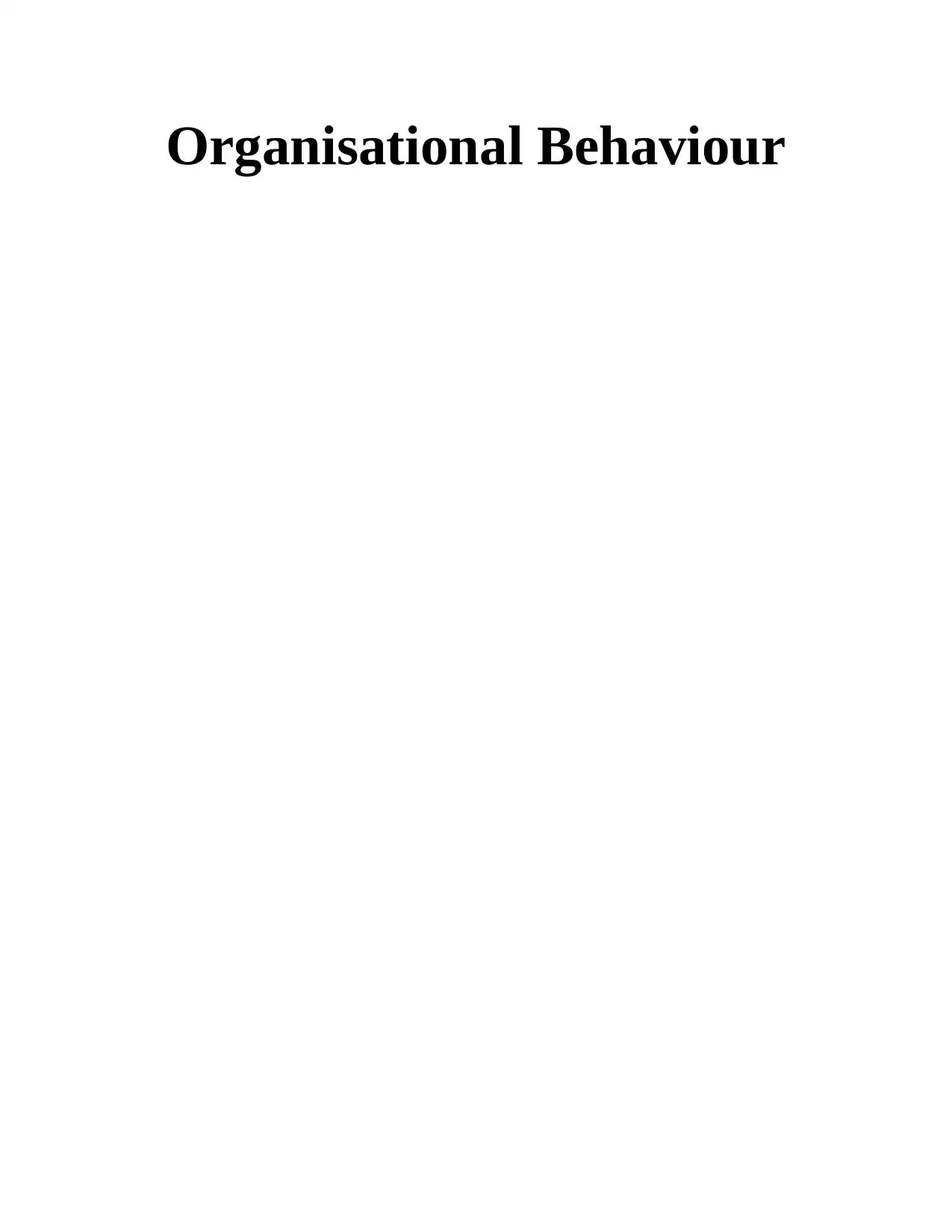
Organisational Behaviour
Paraphrase This Document
Need a fresh take? Get an instant paraphrase of this document with our AI Paraphraser
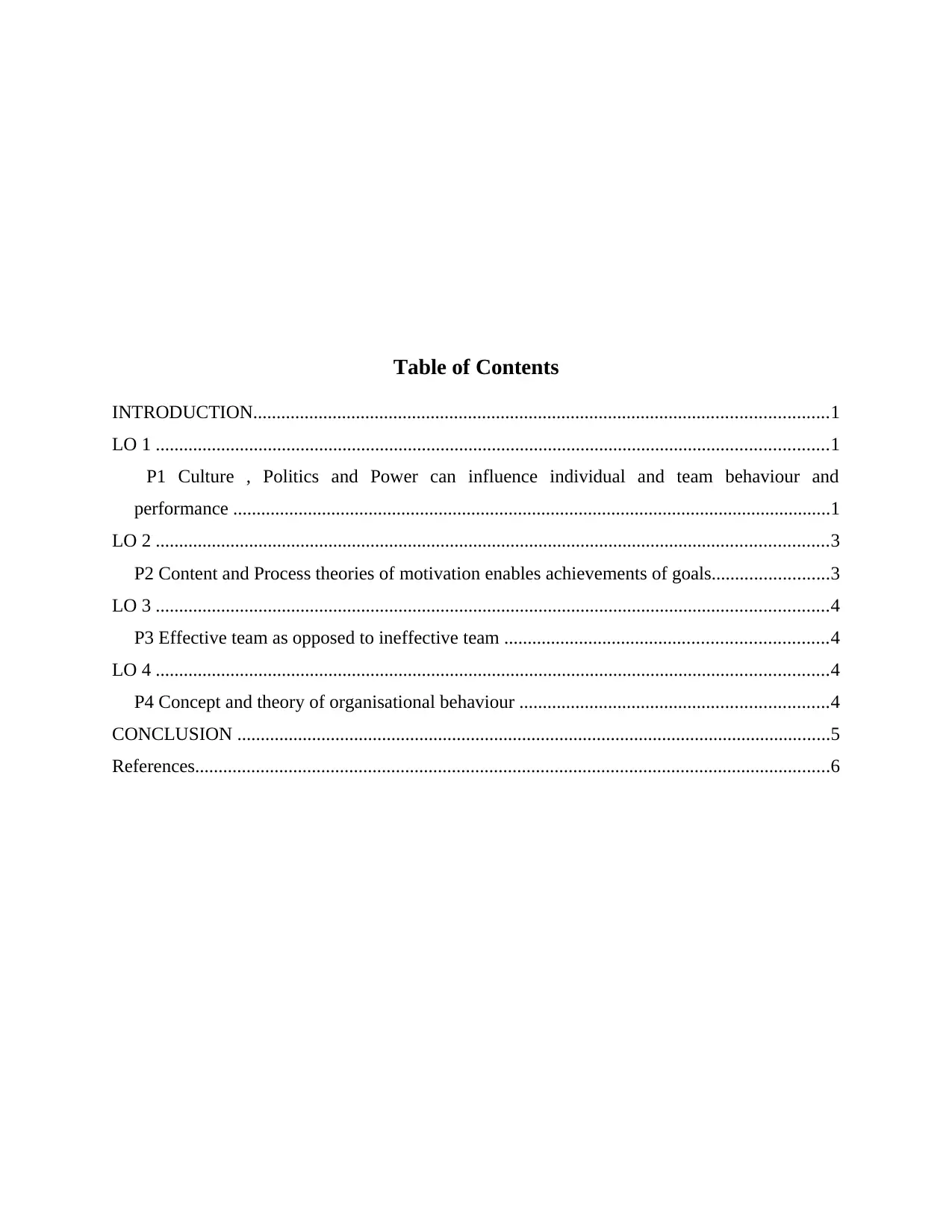
Table of Contents
INTRODUCTION...........................................................................................................................1
LO 1 ................................................................................................................................................1
P1 Culture , Politics and Power can influence individual and team behaviour and
performance ................................................................................................................................1
LO 2 ................................................................................................................................................3
P2 Content and Process theories of motivation enables achievements of goals.........................3
LO 3 ................................................................................................................................................4
P3 Effective team as opposed to ineffective team .....................................................................4
LO 4 ................................................................................................................................................4
P4 Concept and theory of organisational behaviour ..................................................................4
CONCLUSION ...............................................................................................................................5
References........................................................................................................................................6
INTRODUCTION...........................................................................................................................1
LO 1 ................................................................................................................................................1
P1 Culture , Politics and Power can influence individual and team behaviour and
performance ................................................................................................................................1
LO 2 ................................................................................................................................................3
P2 Content and Process theories of motivation enables achievements of goals.........................3
LO 3 ................................................................................................................................................4
P3 Effective team as opposed to ineffective team .....................................................................4
LO 4 ................................................................................................................................................4
P4 Concept and theory of organisational behaviour ..................................................................4
CONCLUSION ...............................................................................................................................5
References........................................................................................................................................6

⊘ This is a preview!⊘
Do you want full access?
Subscribe today to unlock all pages.

Trusted by 1+ million students worldwide
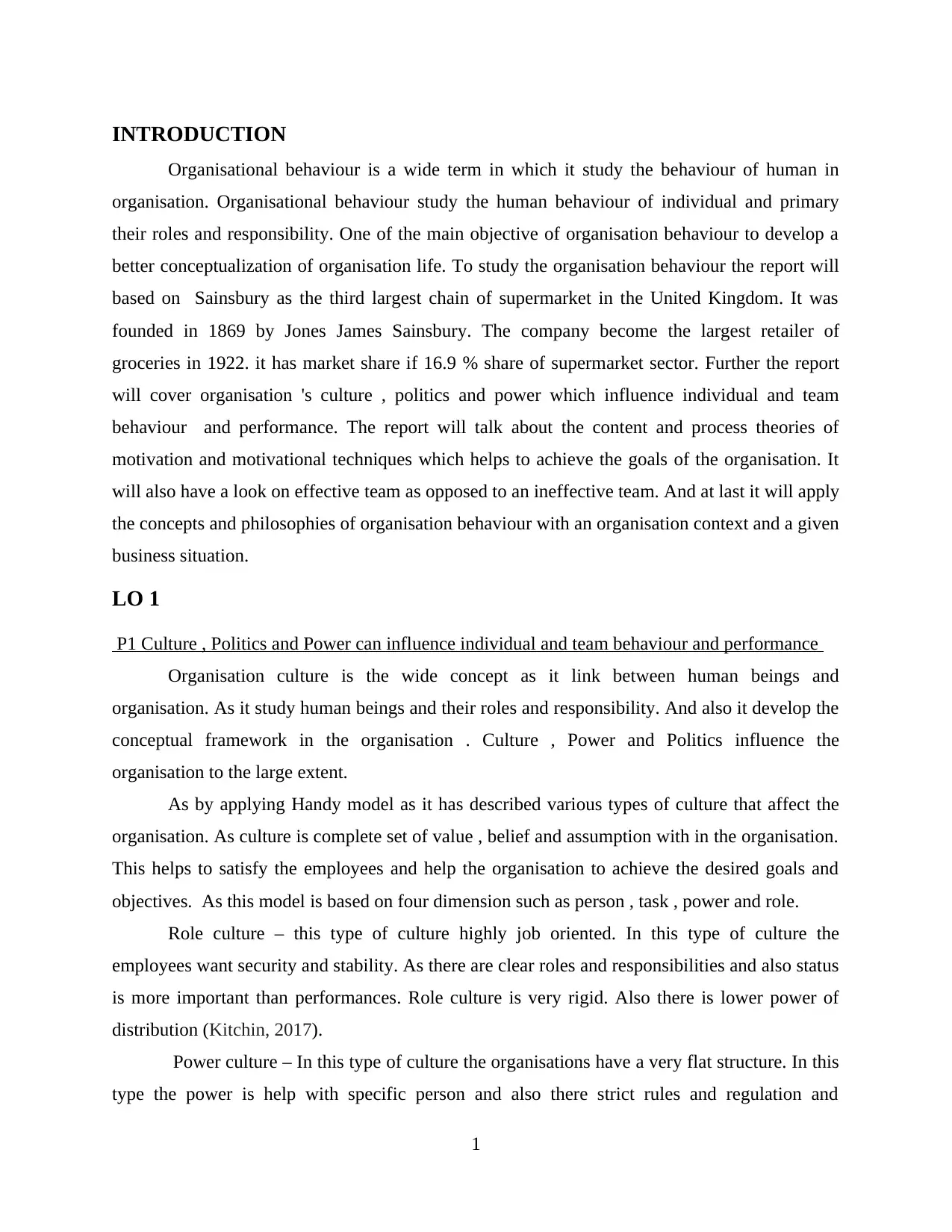
INTRODUCTION
Organisational behaviour is a wide term in which it study the behaviour of human in
organisation. Organisational behaviour study the human behaviour of individual and primary
their roles and responsibility. One of the main objective of organisation behaviour to develop a
better conceptualization of organisation life. To study the organisation behaviour the report will
based on Sainsbury as the third largest chain of supermarket in the United Kingdom. It was
founded in 1869 by Jones James Sainsbury. The company become the largest retailer of
groceries in 1922. it has market share if 16.9 % share of supermarket sector. Further the report
will cover organisation 's culture , politics and power which influence individual and team
behaviour and performance. The report will talk about the content and process theories of
motivation and motivational techniques which helps to achieve the goals of the organisation. It
will also have a look on effective team as opposed to an ineffective team. And at last it will apply
the concepts and philosophies of organisation behaviour with an organisation context and a given
business situation.
LO 1
P1 Culture , Politics and Power can influence individual and team behaviour and performance
Organisation culture is the wide concept as it link between human beings and
organisation. As it study human beings and their roles and responsibility. And also it develop the
conceptual framework in the organisation . Culture , Power and Politics influence the
organisation to the large extent.
As by applying Handy model as it has described various types of culture that affect the
organisation. As culture is complete set of value , belief and assumption with in the organisation.
This helps to satisfy the employees and help the organisation to achieve the desired goals and
objectives. As this model is based on four dimension such as person , task , power and role.
Role culture – this type of culture highly job oriented. In this type of culture the
employees want security and stability. As there are clear roles and responsibilities and also status
is more important than performances. Role culture is very rigid. Also there is lower power of
distribution (Kitchin, 2017).
Power culture – In this type of culture the organisations have a very flat structure. In this
type the power is help with specific person and also there strict rules and regulation and
1
Organisational behaviour is a wide term in which it study the behaviour of human in
organisation. Organisational behaviour study the human behaviour of individual and primary
their roles and responsibility. One of the main objective of organisation behaviour to develop a
better conceptualization of organisation life. To study the organisation behaviour the report will
based on Sainsbury as the third largest chain of supermarket in the United Kingdom. It was
founded in 1869 by Jones James Sainsbury. The company become the largest retailer of
groceries in 1922. it has market share if 16.9 % share of supermarket sector. Further the report
will cover organisation 's culture , politics and power which influence individual and team
behaviour and performance. The report will talk about the content and process theories of
motivation and motivational techniques which helps to achieve the goals of the organisation. It
will also have a look on effective team as opposed to an ineffective team. And at last it will apply
the concepts and philosophies of organisation behaviour with an organisation context and a given
business situation.
LO 1
P1 Culture , Politics and Power can influence individual and team behaviour and performance
Organisation culture is the wide concept as it link between human beings and
organisation. As it study human beings and their roles and responsibility. And also it develop the
conceptual framework in the organisation . Culture , Power and Politics influence the
organisation to the large extent.
As by applying Handy model as it has described various types of culture that affect the
organisation. As culture is complete set of value , belief and assumption with in the organisation.
This helps to satisfy the employees and help the organisation to achieve the desired goals and
objectives. As this model is based on four dimension such as person , task , power and role.
Role culture – this type of culture highly job oriented. In this type of culture the
employees want security and stability. As there are clear roles and responsibilities and also status
is more important than performances. Role culture is very rigid. Also there is lower power of
distribution (Kitchin, 2017).
Power culture – In this type of culture the organisations have a very flat structure. In this
type the power is help with specific person and also there strict rules and regulation and
1
Paraphrase This Document
Need a fresh take? Get an instant paraphrase of this document with our AI Paraphraser
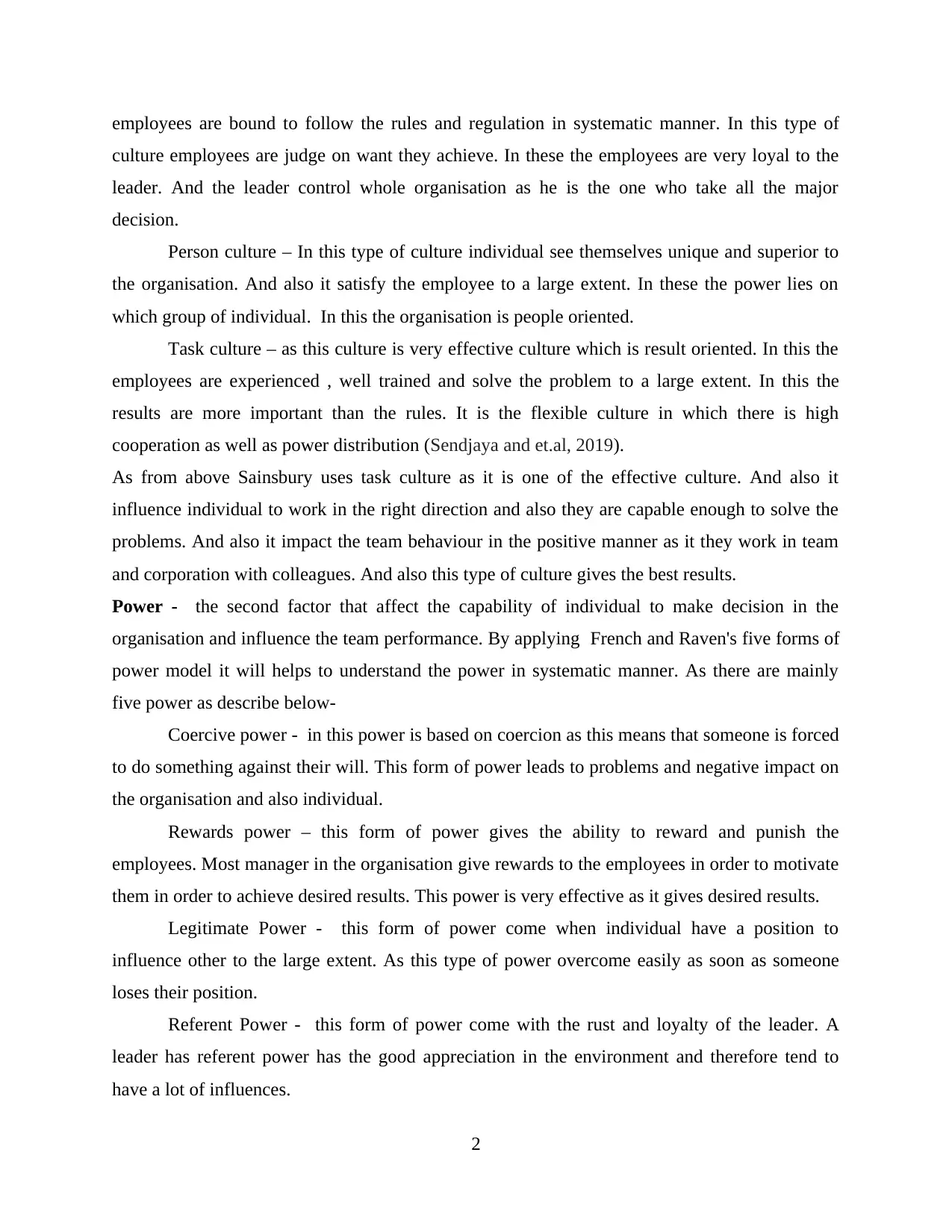
employees are bound to follow the rules and regulation in systematic manner. In this type of
culture employees are judge on want they achieve. In these the employees are very loyal to the
leader. And the leader control whole organisation as he is the one who take all the major
decision.
Person culture – In this type of culture individual see themselves unique and superior to
the organisation. And also it satisfy the employee to a large extent. In these the power lies on
which group of individual. In this the organisation is people oriented.
Task culture – as this culture is very effective culture which is result oriented. In this the
employees are experienced , well trained and solve the problem to a large extent. In this the
results are more important than the rules. It is the flexible culture in which there is high
cooperation as well as power distribution (Sendjaya and et.al, 2019).
As from above Sainsbury uses task culture as it is one of the effective culture. And also it
influence individual to work in the right direction and also they are capable enough to solve the
problems. And also it impact the team behaviour in the positive manner as it they work in team
and corporation with colleagues. And also this type of culture gives the best results.
Power - the second factor that affect the capability of individual to make decision in the
organisation and influence the team performance. By applying French and Raven's five forms of
power model it will helps to understand the power in systematic manner. As there are mainly
five power as describe below-
Coercive power - in this power is based on coercion as this means that someone is forced
to do something against their will. This form of power leads to problems and negative impact on
the organisation and also individual.
Rewards power – this form of power gives the ability to reward and punish the
employees. Most manager in the organisation give rewards to the employees in order to motivate
them in order to achieve desired results. This power is very effective as it gives desired results.
Legitimate Power - this form of power come when individual have a position to
influence other to the large extent. As this type of power overcome easily as soon as someone
loses their position.
Referent Power - this form of power come with the rust and loyalty of the leader. A
leader has referent power has the good appreciation in the environment and therefore tend to
have a lot of influences.
2
culture employees are judge on want they achieve. In these the employees are very loyal to the
leader. And the leader control whole organisation as he is the one who take all the major
decision.
Person culture – In this type of culture individual see themselves unique and superior to
the organisation. And also it satisfy the employee to a large extent. In these the power lies on
which group of individual. In this the organisation is people oriented.
Task culture – as this culture is very effective culture which is result oriented. In this the
employees are experienced , well trained and solve the problem to a large extent. In this the
results are more important than the rules. It is the flexible culture in which there is high
cooperation as well as power distribution (Sendjaya and et.al, 2019).
As from above Sainsbury uses task culture as it is one of the effective culture. And also it
influence individual to work in the right direction and also they are capable enough to solve the
problems. And also it impact the team behaviour in the positive manner as it they work in team
and corporation with colleagues. And also this type of culture gives the best results.
Power - the second factor that affect the capability of individual to make decision in the
organisation and influence the team performance. By applying French and Raven's five forms of
power model it will helps to understand the power in systematic manner. As there are mainly
five power as describe below-
Coercive power - in this power is based on coercion as this means that someone is forced
to do something against their will. This form of power leads to problems and negative impact on
the organisation and also individual.
Rewards power – this form of power gives the ability to reward and punish the
employees. Most manager in the organisation give rewards to the employees in order to motivate
them in order to achieve desired results. This power is very effective as it gives desired results.
Legitimate Power - this form of power come when individual have a position to
influence other to the large extent. As this type of power overcome easily as soon as someone
loses their position.
Referent Power - this form of power come with the rust and loyalty of the leader. A
leader has referent power has the good appreciation in the environment and therefore tend to
have a lot of influences.
2
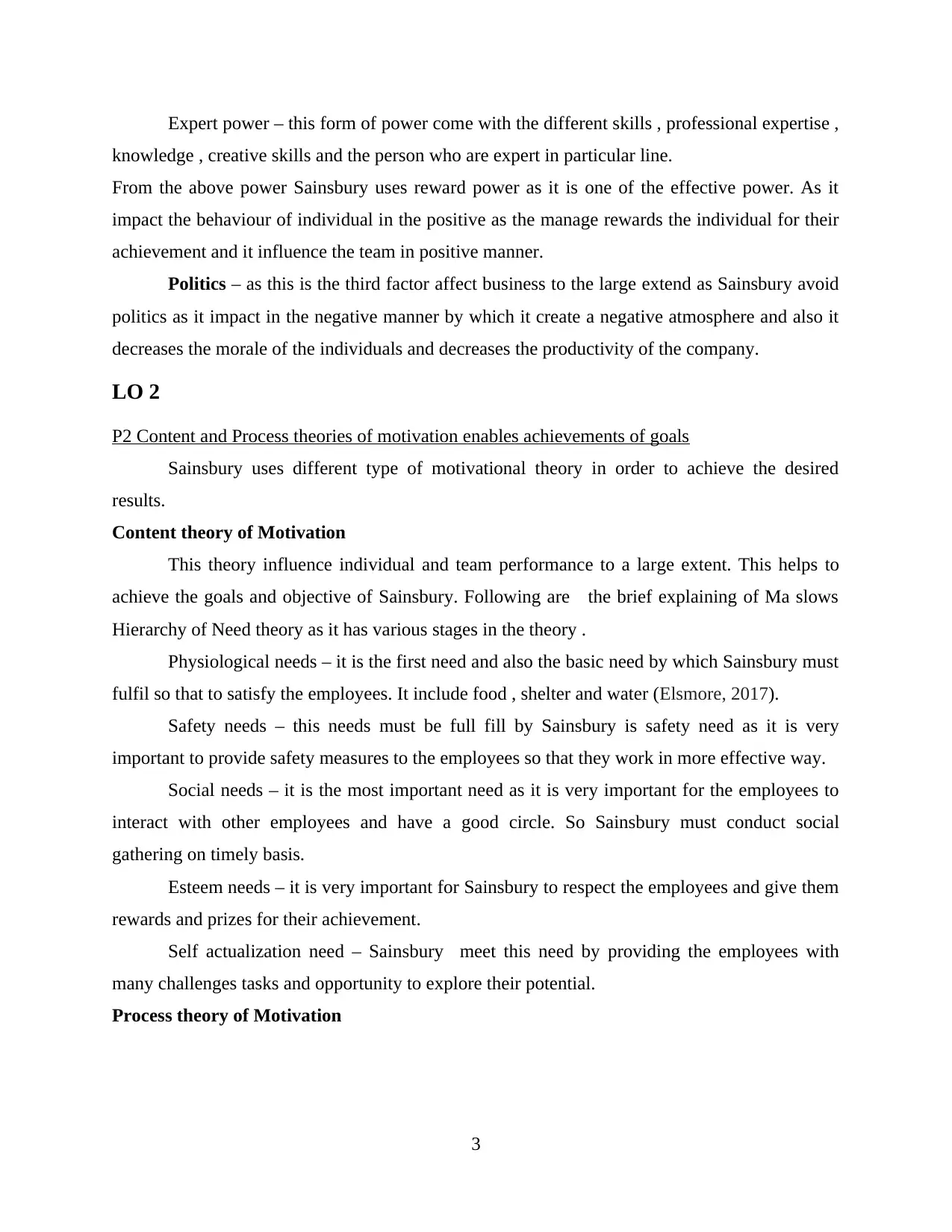
Expert power – this form of power come with the different skills , professional expertise ,
knowledge , creative skills and the person who are expert in particular line.
From the above power Sainsbury uses reward power as it is one of the effective power. As it
impact the behaviour of individual in the positive as the manage rewards the individual for their
achievement and it influence the team in positive manner.
Politics – as this is the third factor affect business to the large extend as Sainsbury avoid
politics as it impact in the negative manner by which it create a negative atmosphere and also it
decreases the morale of the individuals and decreases the productivity of the company.
LO 2
P2 Content and Process theories of motivation enables achievements of goals
Sainsbury uses different type of motivational theory in order to achieve the desired
results.
Content theory of Motivation
This theory influence individual and team performance to a large extent. This helps to
achieve the goals and objective of Sainsbury. Following are the brief explaining of Ma slows
Hierarchy of Need theory as it has various stages in the theory .
Physiological needs – it is the first need and also the basic need by which Sainsbury must
fulfil so that to satisfy the employees. It include food , shelter and water (Elsmore, 2017).
Safety needs – this needs must be full fill by Sainsbury is safety need as it is very
important to provide safety measures to the employees so that they work in more effective way.
Social needs – it is the most important need as it is very important for the employees to
interact with other employees and have a good circle. So Sainsbury must conduct social
gathering on timely basis.
Esteem needs – it is very important for Sainsbury to respect the employees and give them
rewards and prizes for their achievement.
Self actualization need – Sainsbury meet this need by providing the employees with
many challenges tasks and opportunity to explore their potential.
Process theory of Motivation
3
knowledge , creative skills and the person who are expert in particular line.
From the above power Sainsbury uses reward power as it is one of the effective power. As it
impact the behaviour of individual in the positive as the manage rewards the individual for their
achievement and it influence the team in positive manner.
Politics – as this is the third factor affect business to the large extend as Sainsbury avoid
politics as it impact in the negative manner by which it create a negative atmosphere and also it
decreases the morale of the individuals and decreases the productivity of the company.
LO 2
P2 Content and Process theories of motivation enables achievements of goals
Sainsbury uses different type of motivational theory in order to achieve the desired
results.
Content theory of Motivation
This theory influence individual and team performance to a large extent. This helps to
achieve the goals and objective of Sainsbury. Following are the brief explaining of Ma slows
Hierarchy of Need theory as it has various stages in the theory .
Physiological needs – it is the first need and also the basic need by which Sainsbury must
fulfil so that to satisfy the employees. It include food , shelter and water (Elsmore, 2017).
Safety needs – this needs must be full fill by Sainsbury is safety need as it is very
important to provide safety measures to the employees so that they work in more effective way.
Social needs – it is the most important need as it is very important for the employees to
interact with other employees and have a good circle. So Sainsbury must conduct social
gathering on timely basis.
Esteem needs – it is very important for Sainsbury to respect the employees and give them
rewards and prizes for their achievement.
Self actualization need – Sainsbury meet this need by providing the employees with
many challenges tasks and opportunity to explore their potential.
Process theory of Motivation
3
⊘ This is a preview!⊘
Do you want full access?
Subscribe today to unlock all pages.

Trusted by 1+ million students worldwide
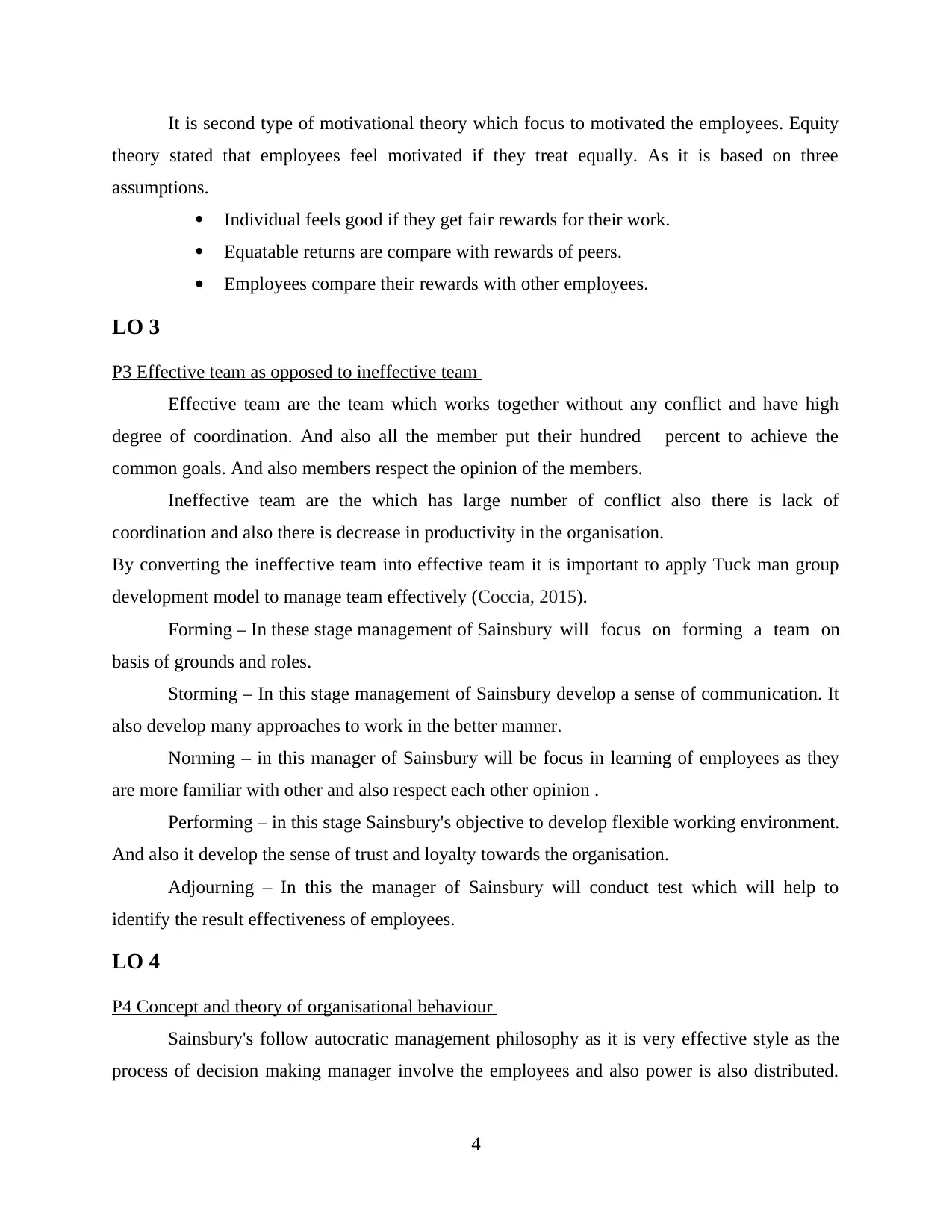
It is second type of motivational theory which focus to motivated the employees. Equity
theory stated that employees feel motivated if they treat equally. As it is based on three
assumptions.
Individual feels good if they get fair rewards for their work.
Equatable returns are compare with rewards of peers.
Employees compare their rewards with other employees.
LO 3
P3 Effective team as opposed to ineffective team
Effective team are the team which works together without any conflict and have high
degree of coordination. And also all the member put their hundred percent to achieve the
common goals. And also members respect the opinion of the members.
Ineffective team are the which has large number of conflict also there is lack of
coordination and also there is decrease in productivity in the organisation.
By converting the ineffective team into effective team it is important to apply Tuck man group
development model to manage team effectively (Coccia, 2015).
Forming – In these stage management of Sainsbury will focus on forming a team on
basis of grounds and roles.
Storming – In this stage management of Sainsbury develop a sense of communication. It
also develop many approaches to work in the better manner.
Norming – in this manager of Sainsbury will be focus in learning of employees as they
are more familiar with other and also respect each other opinion .
Performing – in this stage Sainsbury's objective to develop flexible working environment.
And also it develop the sense of trust and loyalty towards the organisation.
Adjourning – In this the manager of Sainsbury will conduct test which will help to
identify the result effectiveness of employees.
LO 4
P4 Concept and theory of organisational behaviour
Sainsbury's follow autocratic management philosophy as it is very effective style as the
process of decision making manager involve the employees and also power is also distributed.
4
theory stated that employees feel motivated if they treat equally. As it is based on three
assumptions.
Individual feels good if they get fair rewards for their work.
Equatable returns are compare with rewards of peers.
Employees compare their rewards with other employees.
LO 3
P3 Effective team as opposed to ineffective team
Effective team are the team which works together without any conflict and have high
degree of coordination. And also all the member put their hundred percent to achieve the
common goals. And also members respect the opinion of the members.
Ineffective team are the which has large number of conflict also there is lack of
coordination and also there is decrease in productivity in the organisation.
By converting the ineffective team into effective team it is important to apply Tuck man group
development model to manage team effectively (Coccia, 2015).
Forming – In these stage management of Sainsbury will focus on forming a team on
basis of grounds and roles.
Storming – In this stage management of Sainsbury develop a sense of communication. It
also develop many approaches to work in the better manner.
Norming – in this manager of Sainsbury will be focus in learning of employees as they
are more familiar with other and also respect each other opinion .
Performing – in this stage Sainsbury's objective to develop flexible working environment.
And also it develop the sense of trust and loyalty towards the organisation.
Adjourning – In this the manager of Sainsbury will conduct test which will help to
identify the result effectiveness of employees.
LO 4
P4 Concept and theory of organisational behaviour
Sainsbury's follow autocratic management philosophy as it is very effective style as the
process of decision making manager involve the employees and also power is also distributed.
4
Paraphrase This Document
Need a fresh take? Get an instant paraphrase of this document with our AI Paraphraser
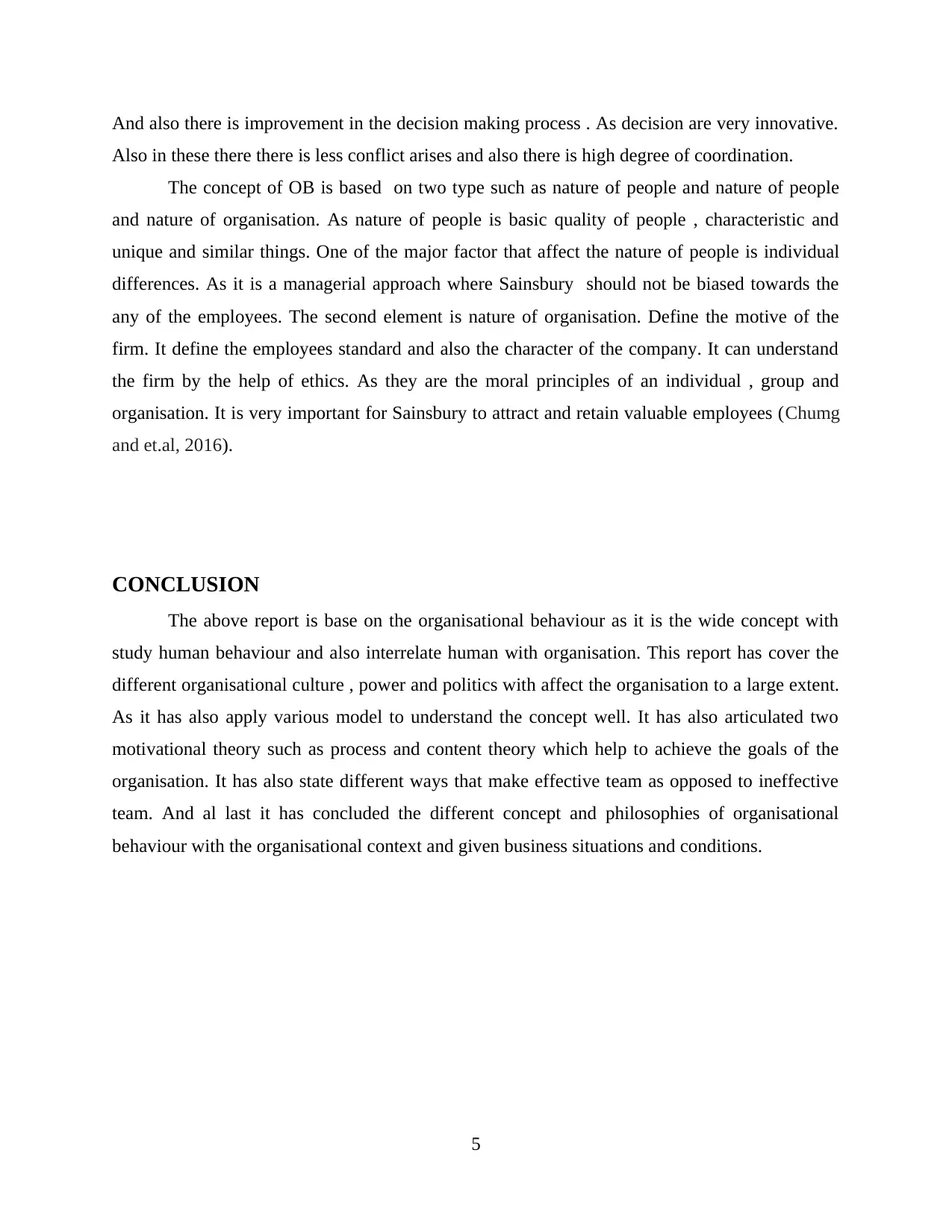
And also there is improvement in the decision making process . As decision are very innovative.
Also in these there there is less conflict arises and also there is high degree of coordination.
The concept of OB is based on two type such as nature of people and nature of people
and nature of organisation. As nature of people is basic quality of people , characteristic and
unique and similar things. One of the major factor that affect the nature of people is individual
differences. As it is a managerial approach where Sainsbury should not be biased towards the
any of the employees. The second element is nature of organisation. Define the motive of the
firm. It define the employees standard and also the character of the company. It can understand
the firm by the help of ethics. As they are the moral principles of an individual , group and
organisation. It is very important for Sainsbury to attract and retain valuable employees (Chumg
and et.al, 2016).
CONCLUSION
The above report is base on the organisational behaviour as it is the wide concept with
study human behaviour and also interrelate human with organisation. This report has cover the
different organisational culture , power and politics with affect the organisation to a large extent.
As it has also apply various model to understand the concept well. It has also articulated two
motivational theory such as process and content theory which help to achieve the goals of the
organisation. It has also state different ways that make effective team as opposed to ineffective
team. And al last it has concluded the different concept and philosophies of organisational
behaviour with the organisational context and given business situations and conditions.
5
Also in these there there is less conflict arises and also there is high degree of coordination.
The concept of OB is based on two type such as nature of people and nature of people
and nature of organisation. As nature of people is basic quality of people , characteristic and
unique and similar things. One of the major factor that affect the nature of people is individual
differences. As it is a managerial approach where Sainsbury should not be biased towards the
any of the employees. The second element is nature of organisation. Define the motive of the
firm. It define the employees standard and also the character of the company. It can understand
the firm by the help of ethics. As they are the moral principles of an individual , group and
organisation. It is very important for Sainsbury to attract and retain valuable employees (Chumg
and et.al, 2016).
CONCLUSION
The above report is base on the organisational behaviour as it is the wide concept with
study human behaviour and also interrelate human with organisation. This report has cover the
different organisational culture , power and politics with affect the organisation to a large extent.
As it has also apply various model to understand the concept well. It has also articulated two
motivational theory such as process and content theory which help to achieve the goals of the
organisation. It has also state different ways that make effective team as opposed to ineffective
team. And al last it has concluded the different concept and philosophies of organisational
behaviour with the organisational context and given business situations and conditions.
5
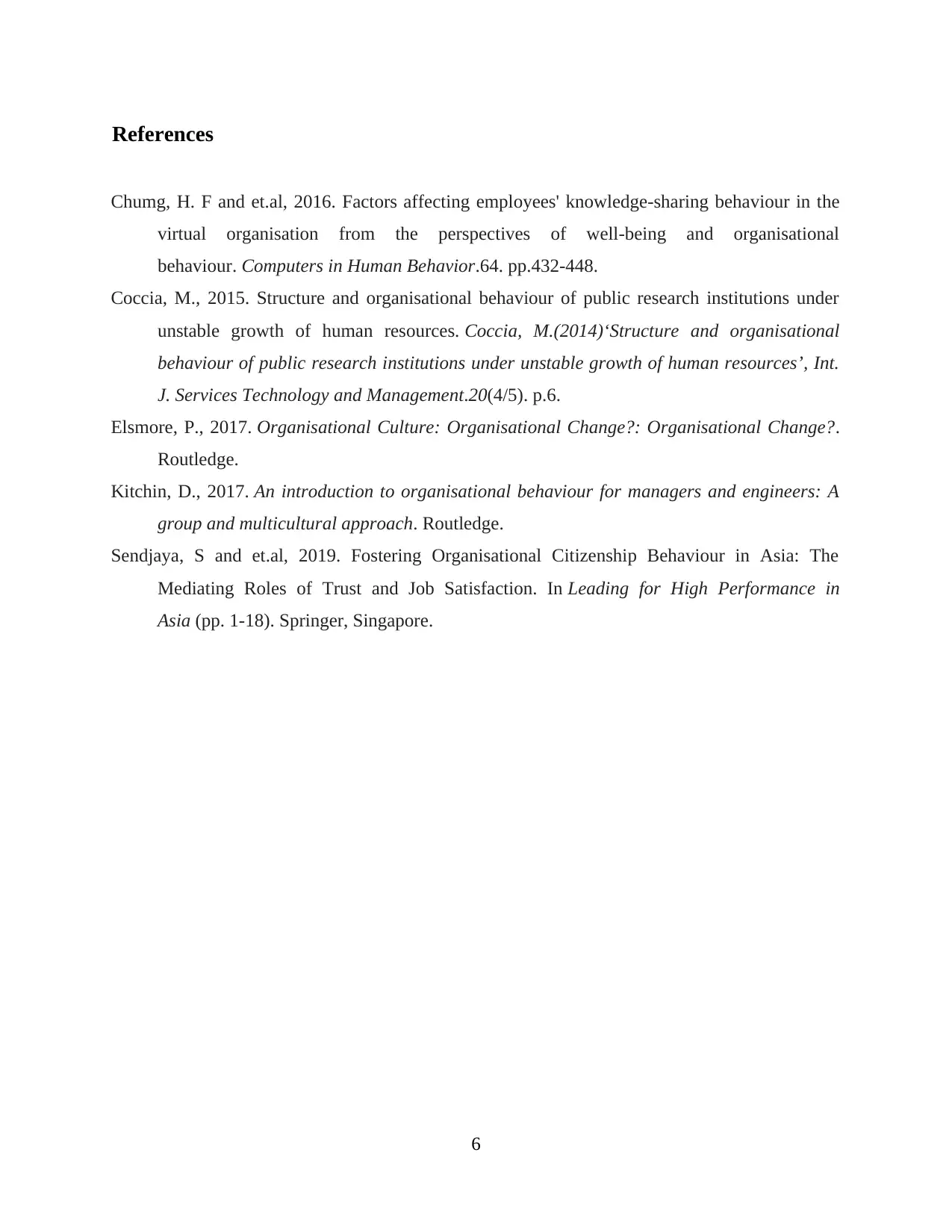
References
Chumg, H. F and et.al, 2016. Factors affecting employees' knowledge-sharing behaviour in the
virtual organisation from the perspectives of well-being and organisational
behaviour. Computers in Human Behavior.64. pp.432-448.
Coccia, M., 2015. Structure and organisational behaviour of public research institutions under
unstable growth of human resources. Coccia, M.(2014)‘Structure and organisational
behaviour of public research institutions under unstable growth of human resources’, Int.
J. Services Technology and Management.20(4/5). p.6.
Elsmore, P., 2017. Organisational Culture: Organisational Change?: Organisational Change?.
Routledge.
Kitchin, D., 2017. An introduction to organisational behaviour for managers and engineers: A
group and multicultural approach. Routledge.
Sendjaya, S and et.al, 2019. Fostering Organisational Citizenship Behaviour in Asia: The
Mediating Roles of Trust and Job Satisfaction. In Leading for High Performance in
Asia (pp. 1-18). Springer, Singapore.
6
Chumg, H. F and et.al, 2016. Factors affecting employees' knowledge-sharing behaviour in the
virtual organisation from the perspectives of well-being and organisational
behaviour. Computers in Human Behavior.64. pp.432-448.
Coccia, M., 2015. Structure and organisational behaviour of public research institutions under
unstable growth of human resources. Coccia, M.(2014)‘Structure and organisational
behaviour of public research institutions under unstable growth of human resources’, Int.
J. Services Technology and Management.20(4/5). p.6.
Elsmore, P., 2017. Organisational Culture: Organisational Change?: Organisational Change?.
Routledge.
Kitchin, D., 2017. An introduction to organisational behaviour for managers and engineers: A
group and multicultural approach. Routledge.
Sendjaya, S and et.al, 2019. Fostering Organisational Citizenship Behaviour in Asia: The
Mediating Roles of Trust and Job Satisfaction. In Leading for High Performance in
Asia (pp. 1-18). Springer, Singapore.
6
⊘ This is a preview!⊘
Do you want full access?
Subscribe today to unlock all pages.

Trusted by 1+ million students worldwide
1 out of 9
Related Documents
Your All-in-One AI-Powered Toolkit for Academic Success.
+13062052269
info@desklib.com
Available 24*7 on WhatsApp / Email
![[object Object]](/_next/static/media/star-bottom.7253800d.svg)
Unlock your academic potential
Copyright © 2020–2026 A2Z Services. All Rights Reserved. Developed and managed by ZUCOL.





